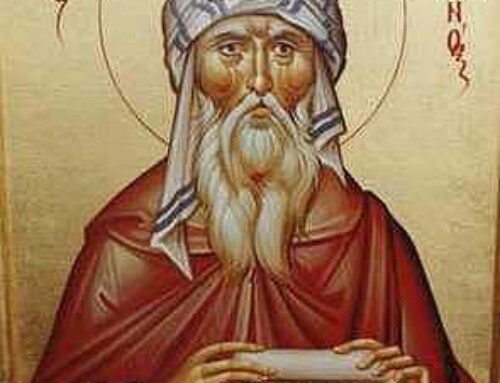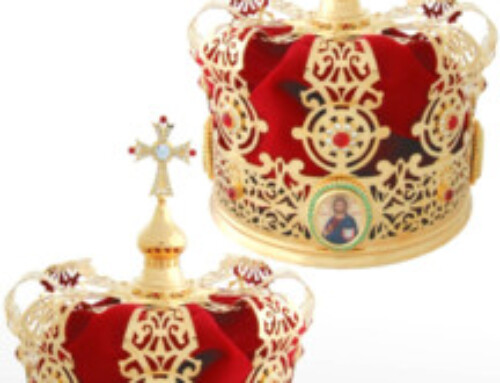Word Magazine February 2001 Page 14-15
A MERCY OF PEACE,
A SACRIFICE OF PRAISE
By Very Rev. John Abdalah
“A MERCY OF PEACE, A SACRIFICE OF PRAISE” is indeed a curious text that requires some thought. Obviously, by the treatment it has received from the great liturgical composers, this phrase must have great importance. But what does it mean? Who offers the mercy, what is the peace, whose sacrifice is it, and what is a sacrifice of praise?
Let’s begin by putting the phrase in context. The deacon stands amidst the congregation, lifts his orarion, and chants, “Let us stand aright; let us stand with fear; let us attend, that we may offer the Holy Oblation in peace.” It is certainly no accident that this invitation is offered not by the priest or bishop, but by the deacon. The deacon, as the leader of the faithful, stands amidst the congregation, calling this whole congregation to prayer and leading the community in the worship. The invitation to offer “a mercy of peace, a sacrifice of praise” is clearly presented to the people of God. It is God’s people who offer the holy oblation in peace.
The deacon calls the faithful to stand upright. Some ancient texts call mothers to gather their children and hold them tightly. So important is what will come to follow, that we continue: “Let us stand with fear,” or in a state of “awe” as is a reasonable and correct response to God. We have no equality with God; we stand as creatures before our creator. We are not afraid of his glory or greatness, yet we stand with respect and awe. “Let us attend” calls us to attention. We are at such a state of readiness because we are to offer the holy oblation in peace.
Holy means belonging to God. So the oblation or offering that we are coming to offer is God’s own. This will be amplified when the bishop or priest says “thine own of thine own,” while the gifts are being held up by the deacon, bishop or priest. A key to understanding this text are the words “in peace,” which we come to understand mean “inside of Christ,” who is our peace. We are baptized into Him and we put Christ on. So we have the deacon calling us, the people of God, to offer Christ’s offering inside of or within the body of Christ. Because Christ is uniquely the Word of God who took on flesh, He alone can be both the offerer and the offered.
The one person of the community who offers to God on behalf of the community is the priest. The priest who fulfills the priesthood of God’s people is Christ. Again, He is the one who offers and is offered. He fulfilled the priesthood by joining himself to human flesh and offering himself, once and for all. By taking on flesh, He restored His divine image to humanity, allowing us once more to be a reflection of God. It is into his priesthood that we are baptized, and it is in this function of priest that we discover our real humanity, which reflects God. This does not exclude us from the additional roles of prophet and king. Nevertheless, it is in the expression of priesthood that we reflect most clearly our function from within the priesthood of Christ. This is what is meant by the “royal priesthood.” This priesthood belongs to all those baptized, as does the function of prophet and king.
We fulfill the ministry of prophet by knowing God’s will for our salvation, of king by ruling over the space God has given us as stewards. But perhaps the image of priest is the most realized in our Christian lives.
Within our metaphor of priesthood, we have at least two functions: ministry and worship. It is in leading the worship, due God the Father, offered in and through the Son by the action and life of the Holy Spirit, that our choirs lead God’s people in praise. This prayer, necessarily liturgical as God’s own, shows us to be in Christ’s priesthood. This action shows us to be human par excellence. Human is that which God created “in His image.” Inside of the Word of God, the divine Logos, we praise God with human words and human voice.
Let us reflect briefly on the offering itself. We offer bread and wine, living elements, both alive with living ingredients. Both the bread and wine involve tedious processes of manufacturing that involve both the actions of God and of humankind. Both come from the seeds of the plants, symbols of new life and regeneration. They then require planting, care for growth, harvesting, milling, the addition of a living agent such as yeast to ferment or grow, and then cooking or distilling. What better symbols could God have used to offer as our offering in resurrection or eternal life?
This is the context in which the choir responds to the deacon’s invitation to offer the holy oblation in peace. We respond first by amplifying what the oblation means. It is Christ’s oblation or offering to us as His mercy and of us to His Father as it expresses His perfect praise. The Church calls on the choir leaders to lead God’s people to offer up in hymns of praise, not spoken, but sung with our whole beings, with brightness and joy, this “mercy of peace, sacrifice of praise.” Praise sets us in a relationship with God that reflects the true nature of man and God. Man praises that which he worships, and worship is meet and right for God. To be in correct relationship with God, we need to submit to His divinity, and circumcise our hearts. We turn to God, and offer ourselves and each other, using our whole being, holding nothing back. We do this, of course inside of Christ’s priesthood, reflecting our own priesthood, given by God in baptism.
The job of the choir leader is a very important one in the life of our Church.
I was asked to reflect, as a priest, on the importance of the choir and on the relationship of the choir to the priest. I believe I have shown that it falls upon the choir to reveal in the liturgy what it means to be in Christ, and reflect His priesthood through praise. This is done most clearly in the context of the liturgy through the singing of the anaphora but is involved in all praise and worship. But our function of praise is even more essential. I believe our very humanity depends on reflecting God, and we reflect God when in Christ we worship. I dare say that we are human because we praise God, and without praising God, we are really something less. I believe that the choir leads us to express our humanity. Our choir leads us to be in Christ’s priesthood, and it is in this action that we share God’s life and are saved. It is the choir that inspires us and lifts us to gather with the community of angels that stand at the throne of God the Father. It is the choir that teaches us the theology of the Church, expressed in Her prayers. It is the choir that reinforces the message of the bishop and presbyter which is preached and proclaimed in the sacraments of liturgy and worship of the Church.
It is from this perspective that I comment on the relationship of the priest to the choir. The choir leads the congregation in offering a mercy of peace, a sacrifice of praise. The liturgy is not, as is sometimes visualized, a dialogue between the priest and the choir. It is an interaction between God and His people. His people are those who in every generation have joined the choirs of angels in singing “Holy, Holy, Holy.”
Because we are joining the liturgy in heaven, celebrated by the angels and saints, we must resist innovations. We humbly join with those who have added their lives to these prayers, one generation after the other. Please resist the temptation to make the liturgy better or “more relevant.” Change is at the expense of our harmony with those who have gone before us but are alive in Christ.
It falls upon the choirs and their directors to demonstrate a relationship of life with God. The fluidity that exists in the worship should reflect the ease of relating to God that was experienced in the Garden of Eden before the fall. It is up to you, the choir director, to express this theology. Not just in this one instance, but in general, it falls to you, the choir director, to understand the Church and Her instruction as expressed through Her worship, which is Her work and Her life. The term liturgy means the “work of God’s people.” Our work, our very function is to worship, to offer our sacrifice of praise. “A mercy of peace, a sacrifice of praise” is praise offered by us from inside of Christ to God the Father. Christ is the one who offers the sacrifice and the perfect praise as the one and perfect “priest.” In Christ we offer our praise in His praise to His Father. The praise is offered liturgically by both the pastor and the people. While it is the pastor who is set aside to live among the congregation and to head God’s people to salvation, it is indeed the choir who brings the congregation to life in worship. It is the choir who brings the voice from the center of our beings, to the ears of our Lord. It is the choir that calls God’s people to worship, and to offer the holy oblation in peace.
Now that you share this understanding of your priesthood, allow me to share some practical reflections on effective priesting:
Remember that Christ is the real priest, and we share in His life. Don’t get too puffed up, because it is His praise, his prayer and his sacrifice after all.
Don’t get angry when those that you love are not ready to sing God’s praise just when you are. God allows us to come when we are ready. In Christ, we need to do the same.
Don’t throw pearls to the swine, or speak of the mysteries to God’s enemies. We must wait patiently for people who are not yet ready to join and to understand our priestly office.
Don’t put music or technique ahead of prayer. We gather to do God’s work of liturgy, not to have the best concert that we can.
Know how important the work that we do is in keeping the ministry of the Church in good order. We must not be too casual or less than prepared for the ministry that has fallen to us.
My prayer is with those choirs everywhere who lead us in offering the holy oblation in peace, a mercy of peace, a sacrifice of praise.
This message was offered in August, 2000 by Fr. John Abdalah to the Sacred Music Conference held at the Antiochian Village.


